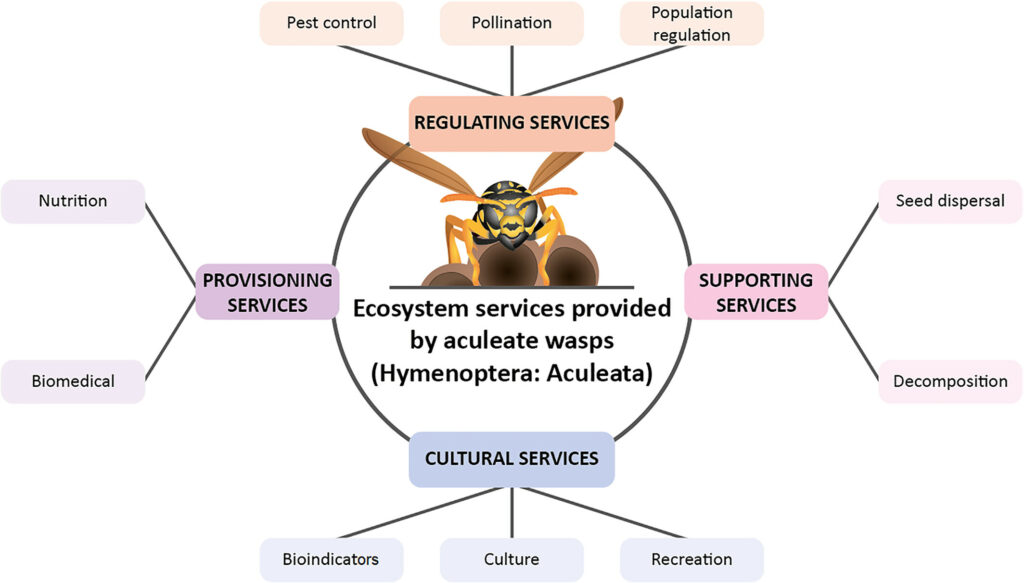The natural world, spanning from individual organisms to entire ecosystems, offers a wide range of functions and benefits known as ecosystem services (ESs) that significantly contribute to human well-being. These services can be broadly categorized into four types: regulating services (e.g., ecosystem process regulation), provisioning services (e.g., material outputs from ecosystems), supporting services (e.g., maintenance of other ESs), and cultural services (e.g., educational and recreational roles of ecosystems) (MEA, 2005). Insects, a highly diverse and abundant group in the animal kingdom, play a vital role in providing various ESs, such as pollination and pest control. In particular, bees have received considerable attention for their contributions to ESs, but other insect groups, including wasps, remain understudied despite their potential significance.
Wasps are a diverse group of insects, with over 33,000 described species within the aculeate wasp suborder, excluding parasitoid wasps (Parasitica) and fig wasps. While parasitoid wasps have received attention for their role in pest regulation, the remaining aculeate wasps, both solitary and social, have been relatively neglected in research and their ES contributions are poorly understood. This oversight is concerning as aculeate wasps are globally distributed and represent a significant portion of hymenopteran species richness.
This comprehensive review focuses on shedding light on the ESs provided by aculeate wasps, including both solitary and social species. Despite their abundance and ecological significance, the services they offer have remained poorly defined and undervalued. Several factors underline the importance of studying these wasps:
- Global Distribution and Diversity: Aculeate wasps are widespread and exhibit high species richness, surpassing the combined species count of well-studied insects like bees and ants.
- Predatory Potential: While the predatory roles of aculeate wasps in regulating arthropod populations have been documented anecdotally, a comprehensive synthesis of empirical data is lacking. Understanding their impact on ecosystems is crucial for conservation efforts and harnessing their ESs.
- Pollination: Aculeate wasps are overlooked as pollinators of ecologically and economically important plants, despite playing a role in pollination networks.
- Disservices and Cultural Perception: The negative aspects of wasps, such as their aggressiveness and stinging behaviour, have dominated their ecological literature, and public perception tends to be unfavourable. Addressing these issues is vital for a more balanced understanding.
- Anthropogenic Pressures: Similar to bees, aculeate wasps face threats from agricultural practices, habitat loss, and climate change, emphasizing the need to assess their ES contributions in a changing environment.
The review identifies ten distinct ways through which aculeate wasps provide ESs, categorized into the four primary areas: regulating services (e.g., pest control through predation), supporting services (e.g., decomposition and seed dispersal), provisioning services (e.g., as a source of nutrition and biomedical compounds), and cultural services (e.g., bioindicators and their portrayal in literature and arts).
These findings highlight the potential significance of aculeate wasps in maintaining ecosystem health and their direct and indirect contributions to human well-being. The review offers a valuable resource by collating and synthesizing existing evidence, thereby providing a more comprehensive understanding of the ESs provided by this often overlooked insect group. Given the current concerns about global insect declines, recognising and conserving the services provided by aculeate wasps is essential for both ecological sustainability and human welfare.
Read the full paper here: https://onlinelibrary.wiley.com/doi/10.1111/brv.12719
